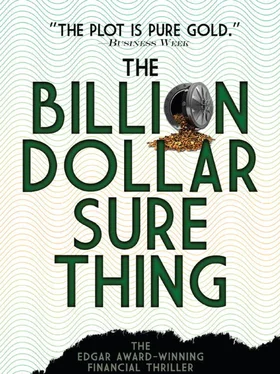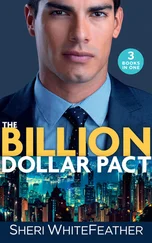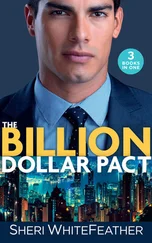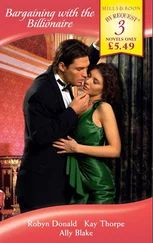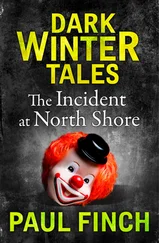Radazan again translated, and Fezali again nodded his agreement.
“All right,” continued Rosen. Once he got started on his favourite subject it was impossible to stop him. “I believe that I have developed one of these opportunities. To you, it will no doubt sound like bringing coals to Newcastle. Nevertheless, I’ll explain it to you. If you like it, fine. We can do business together right now. If not, fine too, and no hard feelings I hope on either side.
“O.K. My idea is quite simply the following. I feel that the time is here to make a very big play on gold bullion and against the United States dollar. All the signals are go—for the first time since the early 1930s. There have been innumerable false starts on this. And the suckers have lost their shirts more than once. But this time I think it will be for real. The absolute key to success will be timing; timing is more important in this field than any other investment area, bar none. If you are wrong in your schedule, when the target date passes the only answer is to bow your head in shame, pick up your marbles, and go. Otherwise you just bleed a slow death.”
Rosen paused again. Apparently Radazan was having a bit of trouble with the Arabic term for “marbles.” Finally he appeared to have once again caught up with Stanley’s rush of words.
“Normally, I do not like one shot deals,” Stanley continued, “but this one looks too tempting. The downside risk is very low relative to the potential profit. At worst we would stand to lose a maximum of 15 percent, but more probably 10 percent. If we win, we will quadruple our money within the next two months.”
Fezali, after once again listening very carefully to Radazan’s repetition of Rosen’s words—all the while with his eyes on Stanley, did not exactly appear overwhelmed by the last part. Through Radazan he voiced his doubts.
“Mr. Rosen, for decades now we in the Near East have been investing in gold. To be sure, our capital remained intact. But for decades it brought us neither interest nor capital gains. Only very recently did the free market price finally move up, hardly by enough to make up for those many years of no income, but still up. The younger people in our family, our organization, came to me. They said that this was the time to get out of gold; to find new and better ways of placing our funds, so that they do not lie sterile for another generation or two. This is one of the reasons why we sought advice in America.”
“The logic was right,” interjected Rosen, “but the timing wrong. In fact, very wrong. Because now, right now, the price of gold could explode. It’s an investment that should bring a sure capital gain, with no downside risk, or an extremely small one. My case is very simple. The American dollar is again in trouble. The reason is that nobody around the world trusts it, because since 1971 it has not been convertible into gold. The American government must do something to restore confidence if the entire world monetary system is not to break down in a way which would make what happened in 1971 look like a Sunday School picnic. The only solution will be to restore dollar convertibility. That will require a massive increase in the price of gold—to at least $125 an ounce and maybe higher. This will then represent the new governmentally guaranteed price for that metal. You can buy gold now for $74 an ounce in London or Zurich. That’s what I suggest we do. After this is over, forget about gold. Permanently. Your young people I understand. But after all these years, they certainly should be able to be patient for just a few more weeks.
“One more thing. You can be sure that when the Americans devalue the dollar relative to gold they will also force through a dollar devaluation relative to the currencies of those countries which have been giving the States such a hard time in the monetary area, like France, Germany, Switzerland, and Japan. Sure, it will hardly be anything near as drastic as with gold, but I figure that at least 10 percent is in the cards.”
There seemed to be no violent disagreement thus far, so Stanley continued. “But now I come to the heart of the matter. Maximum leverage. We squeeze everything we can get out of our $100 million in cold cash. Money like that talks very loud. And I’m thinking in terms of what we back home call a double whammy. First step, we deposit our $100 million in a Swiss bank. Second, we take out a credit of a matching $100 million, and put everything into gold: $200 million worth.”
He was interrupted by Radazan. “You call that maximum leverage? Remember I’m a banker, and as one from the Near East I know more than a little bit about gold. You’re talking about putting up 50 percent cash margin on gold bullion. I know 20 percent will be enough—not that I’m suggesting we go that far.”
Rosen cut in. “Hold on. I’m not through. The final stage of the operation is that we go massively short on the American dollar. I figure that if we block all that gold as a guarantee, we can sell at least $1.5 billion short, and maybe $2 billion in the forward market. If my calculations are correct, we would stand to make $100 million on gold, and another $200 million on our short dollar position. That’s not as much as Howard Hughes made when he sold his TWA stock in the 1960s, but it comes as close as anybody else has managed since.”
The two Arabs went into a huddle.
“Before we get down to the principle involved,” said Radazan, “I’d first like to point out that if, and I say if , your theories are right, we would stand to make almost the same money by simply putting everything into gold bullion. If we operate on a 20 percent cash margin, we could buy half a billion dollars worth of gold—which, you say, is sure to move up 50 percent in price almost immediately thereafter. Then we would not have to run any risks in the foreign exchange market.”
“Aha,” replied Rosen. “I see you’re with me all the way. But you forget one little factor. The gold bullion market is a delicate one. Even the purchase of $200 million will push the price up. To try to buy half a billion dollars worth could wreck the market.”
“The Libyan government did it a couple of years ago.”
“Yeah. And they pushed the price up $15 an ounce in the process.”
“What makes you think it will be that easy to sell $2 billion short?”
“Easy it will not be. But also not that difficult. In the forward foreign exchange market billions of dollars are bought and sold every day in the week. Sure, we might cause a flurry in the market—but only that.”
Again Radazan consulted with his uncle.
“If everything turns wrong, how much would we lose?”
“On the gold, nothing. We would just have to take our time unloading, that’s all. On the currency operation, about 1 percent of the face amount. On $2 billion, that would be $20 million.”
Rosen smiled. “That’s the kind of game Stanley Rosen likes to play. I figure that if the entire deal goes haywire, we’ll drop a maximum—remember, maximum —of $20 million on the foreign exchange side. It could just as well be nothing, however, and it is not impossible that we could even luck through with a tiny profit. But still, we would have a $100 million loan outstanding for perhaps a half year until we could prudently unload that gold. So that would mean, say, $5 million interest. But against that we have a $300 million profit potential. Three hundred to twenty-five—them are the odds I like at the race track, but believe me, this is not a race track.”
“Fine, Mr. Rosen,” said Radazan. “But that still leaves us with what you yourself termed the most important factor in this type of operation—timing. What makes you so sure you’re right on that?”
“I’m not sure. But I intend to become surer. You understand me? That’s what you pay me for. Right?”
Читать дальше
